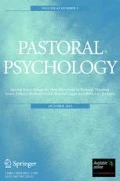Abstract
In today’s world, Western medicine has a dominant place in most people’s lives, and that is true in contemporary China. However, many Chinese people also seek healing from Chinese medicine. Although it is an old method of medical treatment, Chinese medicine still maintains its vitality. Some Chinese people tend to believe that some illnesses can only be cured by Chinese medicine. How has Chinese medicine maintained its vitality for thousands of years? The reason may lie in its roots, roots full of spiritual nourishment. In this article, we propose that traditional Chinese medicine (TCM) is a medicine that takes care not only of persons with illness; it is concerned about people as a whole. In the theory of TCM, the mind and the body of a person are inseparable; to have good health one must have good spirit and pay attention to cultivating one’s spirit. TCM is a field that is profoundly influenced by traditional Chinese philosophy and religion. In many TCM classic writings, we can find religious concepts and practices. This article examines six aspects of TCM: the history of TCM; fundamental beliefs of TCM; spirituality in traditional Chinese healing rituals; spirituality in the traditional Chinese pharmacy; spirituality in health maintenance theories; and the spirituality of master doctors of TCM.
Similar content being viewed by others
References
Bankart, P. (2006). Talking cures: History of Western and Eastern psychotherapies. Shanghai: Social Science Press.
Cai, A. (1982). ‘Zhu You’ and psychological therapy. Selected Thesis of Thesis completion on TCM, Fujian province.
Chen, L., & Ji, L. (2010). Basic theories of Chinese medicine. Jinan: Jinan University Press.
Gridney, C. (1988). World history of medicine. Vol. 1. Beijing: Beijing Commercial Press.
He, Y. (1990). Introduction to psychosomatic medicine. Shanghai: Shanghai Traditional Chinese Medicine Press.
He, Y. (1994). On relationship of TCM and shaman culture—postscript of “TCM out of shamanism.” Medicine and Philosophy, 9, 30–32.
He, Y. (2007a). Songs of health cultivation from ancient China. Longevity, 3, 47.
He, Z. (2007b). On “Six incurables” by Bian Que. Journal of Liaoning University of Traditional Chinese Medicine, 9(1), 18.
Hong, P. (2008). Talks of Chinese medicine of three thousand years. Xi An: Shanxi People’s Press.
Huang, J. (1990). Explanation of Mengzi’s theory on cultivation of Qi by Shantianfanggu. Journal of Humanism, 24, 19–42.
Huang, Z. (2008). To cultivate health and cure illnesses depends on adjusting Qi. Family Chinese Medicine and Pharmacy, 4, 20–22.
Kai, T. (Ed.) (2010). Tao De Jing: A reader. Beijing: Zhong Hua Book Company.
Li, S. (2007). A study on the eight extra-channels. Beijing: Traditional Chinese Medicine Press.
Li, S. (2009) Guan Zi. Beijing: Chinese Book Company.
Lin, P., & Zheng, M. (2007). History of medicine and pharmacology of China. Nanning: Guangxi Normal University Press.
Liu, X. (2009a). Garden of anecdotes. Trans. and annotated by Cheng Xiang. Beijing: Beijing University Publications.
Liu, Y. (Ed.) (2009b). The Yellow Emperor’s Classic of Medicine. Beijing: Huawen Press.
Long, F. (2002). Tao of music—a thesis on the philosophy of traditional Chinese Music, the third session: To use images to express a meaning. Journal of Xinghai Music Conservatory, 3, 27–33.
Lu, Z., & Xiao, H. (1987). Psychological therapy in TCM—primary examination of Zhu You. Medicine and Philosophy, 1, 37.
Meng, X., & Cui, J. (2008). Application of the cognitive method of analogy between universe and people in Chinese and Western medicine. Journal of Preclinical Medicine of TCM, 14, 582–587.
Nelson, J. M. (2007). Psychology, religion, and spirituality. New York: Springer.
Tang, Z. (1892). Five kinds of medical books. Classic Books. www.wujue.com/zyzy/zycd/z/200704/30422.html. Accessed 21 Feb 2011.
Tong, L. (2003). Religious culture and Chinese and Tibetan medicine. Medicine and Philosophy, 24, 52–53.
Wang, Q. (1996). Religion and medicine. Journal of Medical School of Shandong, Social Sciences Edition, 1, 9–13.
Wang, C. (2008). Hand talks. Haerbin: Northern Art Press.
Wang, H., & Li, K. (1988). Heart. Beijing: Scientific Popularization Press.
Xia, L. (1995). Shamanism and folk medicine of Uyghur nationality. Journal of Ke Shi Normal School, 10, 90–96.
Xiao, T. (2010) On the highest level of human development. http://blog.sina.com.cn/daomyy, (pp. 9–17). Accessed 15 Oct 2010.
Xu, Z. (2009). Exploration of Zhu You. http://blog.sina.com.cn/xuzhg2002.
Xue, D., & Yang, H. (2000). Thoughts of environmental health in theory of Qi in Chinese medicine. Journal of Shanxi Chinese Medicine Institute, 1, 18.
Xun, K. (2008). Xun Zi. Ed. Li, Zuofeng. Beijing: Higher Education Press.
Yang, Y. (2011). A comparative study of human theory between Buddhism and Taoism. www.360doc.com. Accessed 20 June 2011.
Yue, A. (2003). On “Qi” and Confucian health preserving science by Meng Zi. Journal of Jin Zhou Medical College (Social Science), 1(5), 50–53.
Zhang, J. (2005). Lei Jing. Vol. 1. Beijing: Xueyuan Press.
Zhang, Q. (2010a). Huangting Zen—heart is Qi. Nanchang: Baihuazhou Art Press.
Zhang, X. (2010b). Qi is the original dynamic of life. www.Blog.163.com., August 30.
Zhang, X. (2006). Emphasis on TCM and learning from West. In X. Liu (Ed.). Beijing: People’s Medical Publishing House.
Author information
Authors and Affiliations
Corresponding author
Rights and permissions
About this article
Cite this article
Shi, L., Zhang, C. Spirituality in Traditional Chinese Medicine. Pastoral Psychol 61, 959–974 (2012). https://doi.org/10.1007/s11089-012-0480-x
Published:
Issue Date:
DOI: https://doi.org/10.1007/s11089-012-0480-x




